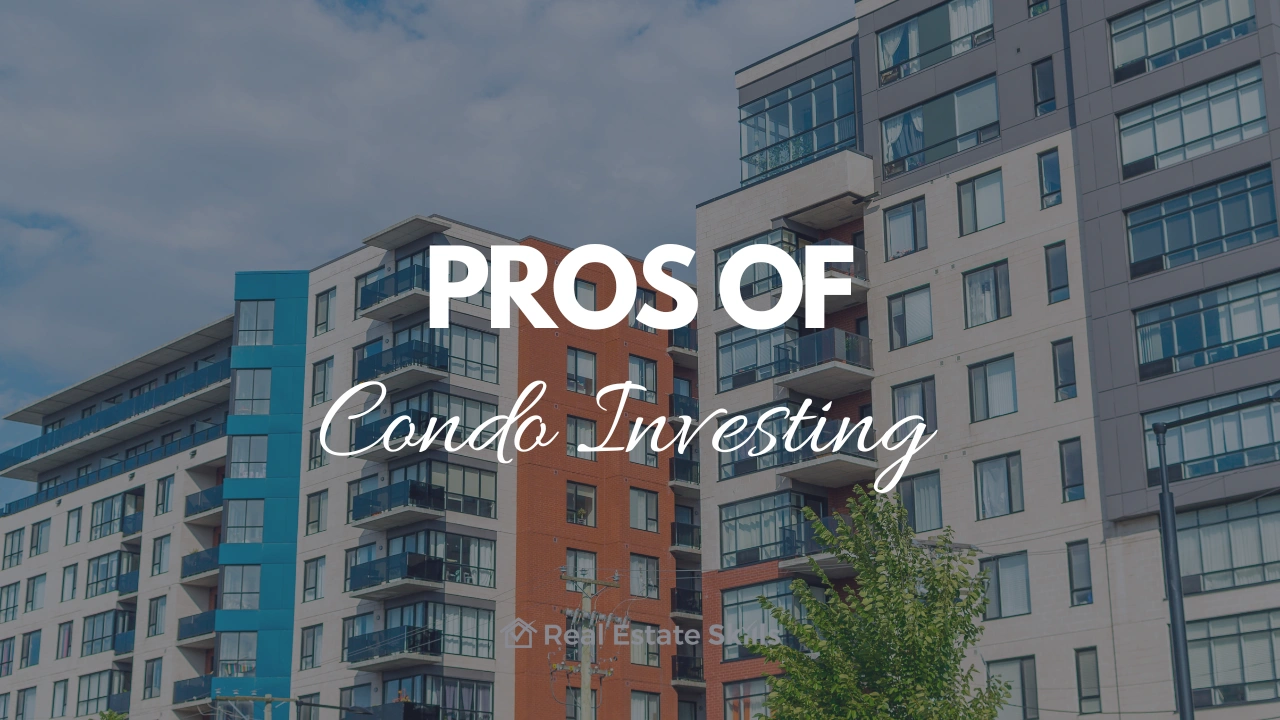
Are Condos a Good Investment? Learn the Risks, Rewards & ROI
Apr 02, 2025
If you’ve been thinking about getting into real estate investing, you’ve probably asked yourself this exact question: Are condos a good investment? Condos often seem like a simple, low-barrier way to start—lower price tags, less maintenance, and locations that renters love. But like any deal in real estate, there’s more to the story than meets the eye.
Investing in condos can absolutely be profitable—but only if you understand how to analyze the numbers, navigate the fine print, and develop the right condo investment strategy. From monthly HOA fees to rental restrictions and resale value, condos have unique factors that can either boost your returns or quietly chip away at your profits.
In this article, we’ll break everything down in a clear, beginner-friendly way. Whether you're brand new to real estate investing or just curious if a condo makes sense for your portfolio, you’ll get the honest pros, cons, and expert tips you need to make an informed decision.
Here’s what we’ll cover:
- Understanding Condo Investments
- Pros of Condo Investing
- Cons of Condo Investing
- Financial Considerations
- Market Trends and Outlook
- Tips for Prospective Condo Investors
- Frequently Asked Questions
Ready to Take the Next Step in Real Estate Investing? Join our FREE live webinar and discover the proven strategies to build lasting wealth through real estate.
Whether you're just getting started or ready to scale, we'll show you how to take action today. Don't miss this opportunity to learn the insider tips and tools that have helped thousands of investors succeed! Seats are limited—Reserve Your Spot Now!
Understanding Condo Investments
Before you jump into buying a condo, it’s important to understand what you’re actually investing in. Condos are structured differently than houses, and those differences can affect everything from your day-to-day responsibilities to your long-term profits. Knowing how they work—and how they fit into your investment goals—is the first step to making a smart, informed decision. Let’s break it down.
What Is a Condo?
A condo—short for condominium—is a type of real estate where you own an individual unit within a larger building or community, but you share common areas like lobbies, pools, gyms, and green spaces with other residents. Think of it as owning your own apartment but with shared responsibilities for the building as a whole.
When comparing condo vs house investment, the key difference is ownership. With a house, you typically own the land and the structure. With a condo, you own the interior space but split responsibility for everything else with the other unit owners—usually through a homeowners association (HOA). This difference can have a big impact on both your freedom and your finances.
How Condo Investments Work
Condo investing starts like any other type of rental property investing—you buy a unit, hold it as an asset, and ideally generate income through rent or appreciation over time. The twist? You’ll also need to factor in the HOA’s rules, monthly fees, and long-term maintenance plans, which can directly affect your bottom line.
A smart condo investment strategy involves carefully selecting a unit in a desirable location, analyzing the numbers to ensure positive cash flow, and understanding the condo association’s financial health. Since you're sharing ownership of the building with others, the HOA’s decisions—like raising fees or approving special assessments—can impact your returns, so it's important to dig into those details before you buy.
This might sound like a lot, but it’s exactly the kind of thing we help new investors navigate inside our program. From analyzing condo docs to projecting ROI, we teach you how to invest with confidence—not just hope it works out.

Pros of Condo Investing
If you’re just starting your real estate investing journey, condos can offer some beginner-friendly advantages. They’re generally more affordable, easier to maintain, and often located in places people actually want to live or vacation. Understanding these benefits can help you decide if investing in condos is the right move for your goals.
Here are a few reasons why condo investing might make sense:
- Affordability Compared to Single-Family Homes: One of the biggest advantages of buying a condo is the price. Compared to single-family homes, condos usually come with a lower purchase cost, which makes them an attractive option for those looking for affordable real estate investments without sacrificing location.
- Desirable Locations and Amenities: Condos are often located in urban centers, near beaches, or close to popular attractions—places where people want to live, rent, or vacation. Many also offer built-in perks like pools, gyms, security, and shared workspaces, making condo amenities a big draw for renters and owners alike.
- Lower Maintenance Responsibilities: Unlike owning a house, where you’re responsible for the roof, landscaping, and exterior repairs, condo maintenance is largely handled by the homeowners association (HOA). That means less time spent on upkeep—and more time focusing on strategy and cash flow.
- Built-In Demand for Rentals: Many condos are located in high-demand areas—downtown cores, near universities, or close to beaches—where renters are constantly looking for places to live. That built-in demand can lead to more consistent occupancy and reliable rental income, especially if short-term or corporate rentals are allowed.
- Potential for Long-Term Appreciation: While appreciation depends heavily on location and timing, some condos in hot or emerging markets can appreciate just like single-family homes. If you buy in the right area, especially one with new development or revitalization projects, you may see steady gains over time.
- Solid Rental Return Potential: In the right market, condos can generate strong rental income—especially when located in high-demand areas or vacation destinations. While returns can vary based on HOA fees and local rental rates, many investors find that condos still deliver solid cash flow, making them an attractive choice for building passive income through real estate.
If you’re looking for a way to invest without taking on the full weight of property management, these benefits make condos an appealing entry point. And if you’re unsure how to analyze the numbers or compare condos vs single-family homes, our program walks you through it step by step.
Cons of Condo Investing
While condo investing has its perks, it’s not all upside. Just like any other real estate investment, condos come with challenges that can catch new investors off guard if they’re not prepared. Here are some of the most important drawbacks to consider before buying a condo:
- Homeowners Association Fees: One of the biggest factors that can eat into your profits is the monthly HOA fees. These fees cover things like landscaping, building upkeep, and shared amenities—but they also reduce your monthly cash flow, so they need to be included in your ROI calculations.
- Potential for Special Assessments: Even if your HOA is well-managed, unexpected costs can pop up in the form of special assessments—extra charges for major repairs like roof replacements or structural updates. These surprise expenses can quickly turn a profitable condo into a money pit.
- Rental and Use Restrictions: Some HOA rules place limits on how—and whether—you can rent out your unit. Common condo rental restrictions include bans on short-term rentals (like Airbnb), minimum lease terms, or caps on the number of units allowed to be rented at one time.
- Limited Control Over Property Decisions: When you invest in a condo, you're subject to decisions made by the condo board—even if you disagree. Whether it's an increase in fees or a new policy that affects your tenants, this lack of control can be frustrating and risky for investors.
- Resale Challenges: Condos don’t always appreciate as quickly as single-family homes, and resale can be trickier in saturated markets. Lenders may also be more cautious when financing condo purchases, which can shrink your pool of potential buyers when it's time to sell.
- Financing Hurdles: Getting a mortgage for a condo can be more complex than financing a house—especially if the condo community isn’t FHA-approved or has a high number of rentals. Lenders often require stricter underwriting, which can limit financing options for you or your future buyers.
Understanding these downsides doesn't mean condos are a bad investment—it just means you need to run the numbers carefully and know what you’re walking into. Inside our program, we teach investors how to evaluate condo deals, review HOA documents, and spot red flags before committing to a property.
*For in-depth training on real estate investing, Real Estate Skills offers extensive courses to get you ready to make your first investment! Attend our FREE Webinar Training and gain insider knowledge, expert strategies, and essential skills to make the most of every real estate opportunity that comes your way!
Financial Considerations
When it comes to condo investing, the financial side of things can get a little more complex than buying a typical house. From how you finance the purchase to how monthly costs affect your cash flow, it’s important to understand the numbers before you dive in.
Financing Challenges
One of the first hurdles many new investors face is condo financing. While getting a mortgage for condos is certainly possible, lenders often have stricter requirements than they do for single-family homes.
For example, if too many units in the building are being rented out, or if the HOA has financial issues, some lenders may deny financing altogether. You may also need to put more money down or pay a higher interest rate, especially if the building isn’t FHA-approved.
That’s why doing your homework—and knowing what questions to ask the lender and the HOA—is so important. Inside our program, we show you exactly how to evaluate a condo community's financials and navigate the loan process with confidence.
Return on Investment (ROI) Potential
When you're exploring condo investing, one of the biggest questions is: what kind of return can I actually expect? That’s where ROI—return on investment—comes in. It’s a simple way to measure how much you’re earning compared to what you put in.
Let’s say you buy a condo for $200,000. After taxes, insurance, and HOA fees, your monthly costs total about $1,400. If you rent it out for $1,800, you’re clearing $400/month in positive cash flow—or $4,800 per year. That alone gives you a 2.4% annual return on the full purchase price.
But here’s where it gets interesting: most people don’t pay for a condo in cash—they use a loan. If you only put 20% down (that’s $40,000), you still earn the same $4,800/year in cash flow. Now your return is 12% on your actual investment—not even counting potential appreciation.
That’s the power of leverage in real estate investing—you can benefit from the full value of the asset, even though you only put in a fraction of the purchase price. Inside our program, we walk you through exactly how to analyze deals like this, use financing to your advantage, and make sure the numbers actually work.

Market Trends and Outlook
The real estate market is constantly evolving, and condo investing is no exception. What works in one year—or even in one city—might not work the next. That’s why it’s so important to understand the current landscape and where things might be headed before making any big decisions. Let’s take a look at the latest real estate market trends and what they mean for today’s condo investors.
Current Real Estate Market Analysis
The U.S. housing market continues to show moderate growth, with home prices rising about 2.6% year-over-year. While that’s slower than the rapid gains of previous years, it still reflects a stable and resilient market—one that’s adjusting to higher interest rates, inflation concerns, and evolving buyer behavior. Inventory remains tight in many areas, keeping competition strong, especially in urban centers and desirable suburban markets.
The condominium sector is following a similar trajectory, though performance varies widely by location. In markets like Manhattan, high-end condos have seen a surge in demand, particularly luxury units priced over $20 million—driven by limited inventory, foreign investment, and buyer confidence. On the flip side, in places like South Florida, updated building safety laws and structural inspection requirements have increased ownership costs, which could put pressure on affordability and future resale values. These shifts highlight just how important it is for investors to stay informed and analyze the specific condo market trends in their area before buying.
Future Predictions for Condo Investments
Looking ahead, most experts expect the housing market to remain relatively stable, with home prices projected to rise around 4% throughout 2025. The condo investment outlook appears similarly steady, though outcomes will heavily depend on location, market demand, and local policy changes.
That said, there’s a new layer of uncertainty to watch: the current administration’s tariff policies. As the government re-evaluates trade relationships and imposes new tariffs on imported construction materials, the cost of building and renovating condominiums could rise. This may reduce new supply in some markets—pushing prices higher—or increase expenses for existing owners trying to maintain or upgrade their properties.
The future of condo investing will reward those who do their homework. As always, we recommend a solid market analysis before making any move—something we walk our students through step-by-step inside our program.

Tips for Prospective Condo Investors
Before you invest in a condo, it’s important to slow down, zoom out, and make sure you’re seeing the full picture. Condos can be great additions to your portfolio—but only if you know exactly what you're getting into. Here are a few essential tips to help you make smarter decisions and avoid rookie mistakes:
- Conduct Thorough Due Diligence: Always do your homework. Condo due diligence means digging into the property’s history, reviewing the HOA’s financials, and understanding the building’s long-term maintenance plans. You want to make sure the HOA is financially healthy, the rules are investor-friendly, and there aren’t any red flags hiding in the fine print.
- Evaluate Location and Demand: Not all condos perform the same—even within the same city. Look for areas with strong condo rental demand, walkability, proximity to jobs or universities, and low vacancy rates. The best places to invest in condos are where people want to live, and rents are on the rise.
- Understand Legal and Financial Obligations: From HOA rules to local zoning laws, condo investment legalities can get complicated quickly. You’ll also want to factor in your ongoing costs—like HOA fees, insurance, and potential special assessments—so you fully understand the financial obligations of condo ownership before signing anything.
If all this sounds overwhelming, you’re not alone. That’s why inside our program, we guide new investors through each of these steps—with templates, checklists, and real-world examples—so you can make confident decisions and invest with clarity, not confusion.
Frequently Asked Questions
Still wondering if condo investing is right for you? You’re not alone. New and experienced investors alike have questions about whether condos are a good investment in today’s market—and what to watch out for. Below are some of the most common questions, answered simply and clearly.
Are condos a good investment for first-time real estate investors?
Yes, condos can be a good entry point for beginners because they’re often more affordable and easier to manage than single-family homes. However, it’s important to run the numbers carefully and review HOA rules before buying.
What makes a condo a good investment property?
A strong rental location, low HOA fees, and solid building maintenance are all signs of a promising condo investment. Positive cash flow and long-term appreciation potential also matter.
Do condos appreciate in value like houses?
Condos can appreciate over time, especially in growing markets, but they may increase in value more slowly than single-family homes. Location and building quality are key factors.
What are the risks of condo investing?
Risks include high HOA fees, rental restrictions, special assessments, and limited control over building decisions. These factors can all impact your return on investment.
Can I use a mortgage to buy an investment condo?
Yes, you can finance a condo, but mortgage for condos can be harder to qualify for if the building has issues like a high number of rentals or weak financials. Lenders may also require a larger down payment.
Is condo investing profitable in 2025?
Condo investing can still be profitable in 2025, especially in high-demand markets with strong rental demand and low inventory. Success depends on deal analysis, location, and HOA stability.
Are there restrictions on renting out a condo I own?
Many condos have HOA rules or rental restrictions that limit short-term or long-term rentals. Always review the condo association’s bylaws before investing.
What should I look for when buying a condo as an investment?
Look for low HOA fees, healthy building reserves, strong local rental demand, and flexible rental policies. These factors all improve your chances of a successful condo investing experience.
Final Thoughts On Condo Investing
So, are condos a good investment? In many cases—yes. With the right research, due diligence, and strategy, condo investing can offer reliable cash flow, appreciation potential, and easier entry into real estate. But it’s not one-size-fits-all. From HOA fees to rental restrictions, every condo deal is different—and understanding those details is key to making smart decisions. If you're serious about learning how to invest the right way, our program teaches you step-by-step how to evaluate deals, avoid costly mistakes, and confidently build your portfolio. Because when you invest with knowledge, you invest with power.
Ready to Take the Next Step in Real Estate Investing? Join our FREE live webinar and discover the proven strategies to build lasting wealth through real estate.
Whether you're just getting started or ready to scale, we'll show you how to take action today. Don't miss this opportunity to learn the insider tips and tools that have helped thousands of investors succeed! Seats are limited—Reserve Your Spot Now!
*Disclosure: Real Estate Skills is not a law firm, and the information contained here does not constitute legal advice. You should consult with an attorney before making any legal conclusions. The information presented here is educational in nature. All investments involve risks, and the past performance of an investment, industry, sector, and/or market does not guarantee future returns or results. Investors are responsible for any investment decision they make. Such decisions should be based on an evaluation of their financial situation, investment objectives, risk tolerance, and liquidity needs.








